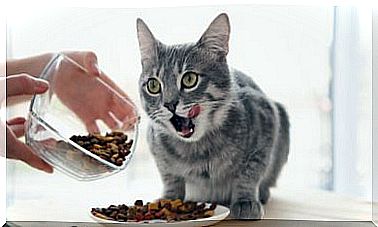4 Main Causes Of Colitis In Dogs

Colitis in dogs is a common disease characterized by irritation of the colon. In fact, it is not an illness in itself, but rather a symptom of many other illnesses and problems.
Literally, colitis means ‘inflammation of the colon’. The colon is the last functional segment of the gastrointestinal (GI) tract, and is responsible for the final stages of digestion.
How to understand colitis in dogs
When the colon’s lining becomes irritated and inflamed, the last part of the digestive process is stopped. As a result, mediators are produced that promote the inflammatory state, the progress of which affects the integrity of the intestinal wall.
In other words, the barrier that separates the intestinal contents from the bloodstream is damaged with colitis, resulting in ulcerations. At the same time, inflammation triggers secretions of mucus and other substances from the lining of the colon, which interfere with normal intestinal motility.
At the cellular level, the colon’s ability to absorb water from food waste and to store and transport feces is reduced. This makes the stool loose, watery, greasy, and sometimes stained with mucus or fresh red blood.

Pets with colitis cannot tell us what they are feeling, but this illness is very similar to colitis in humans. Thus, we can assume that a dog with this condition is dealing with a lot of discomfort and pain.
Main Causes of Colitis in Dogs
1. Change in microbiota or intestinal dysbiosis
The intestinal microbiota is the set of all living microorganisms – bacteria, fungi, protozoa and viruses – that inhabit the gastrointestinal tract. Bacteria are the most abundant microbes in the intestine.
Although the term ‘gut flora’ is often used in traditional literature, ‘microbiota’ – from the Greek ‘bio’: ‘life’ – is the most appropriate term.
The diversity of bacterial species that inhabit the intestine is enormous. They inhabit the gut and establish their own ecosystem; when the state of health is good, this ecosystem achieves a balance.
The number of bacteria in the colon is estimated to be in the billions of cells. This is approximately 10 times more than the number of cells in the dog’s entire body; hence its importance.
Altering the normal balance of the microbiota is known as intestinal dysbiosis. Changes are understood as changes in composition or richness, that is, in the diversity of unique bacterial species.
This microbiota alteration can be induced by a variety of factors, from antibiotic treatment to inadequate diet and stress.
Studies in humans and dogs have linked intestinal dysbiosis to various gastrointestinal disorders. These include inflammatory bowel disease, granulomatous colitis, and irritable bowel syndrome.
Although it is not always clear whether dysbiosis is the cause or the effect of the gastrointestinal disease, it is known that the restoration of the microbiota has a favorable effect on the treatment of the disease.
2. Stress
Canine stress is a major cause of colitis, especially in dogs that have come from shelters. Events such as travel and moving can cause stress, but each dog has its own trigger for the problem, which can lead to colitis.
3. Infections or parasites
Escherichia Coli, Salmonella, Giardia , worms and other bacterial and parasitic infections of the intestine can cause colitis. Dogs are infected through contaminated food or water, or through other dogs.
So, remember to bring a water bottle and a retractable bowl during longer walks, so your dog doesn’t feel like drinking the pooled water. Also keep in mind that even water that looks clean can be contaminated.
4. Allergies
Dogs can be allergic to the same allergens as humans, from food to the environment and household items. As with human allergies, allergies in dogs can be difficult to diagnose.
The importance of breed for the development of colitis in dogs
It is known that genetic factors are important when we talk about inflammatory bowel diseases.
Boxer dogs, for example, are predisposed to histiocytic ulcerative colitis, which is associated with canine inflammatory bowel disease, while German shepherds have a higher incidence of lymphocytic-plasmocytic enterocolitis.

Irritable bowel syndrome, a common cause of colitis in dogs, is often seen in nervous animals. Pets that eat indiscriminately, as well as animals that roam alone outdoors, also have an increased risk of colitis.
As you can see, it is possible to prevent or reduce the factors that can cause your dog to develop colitis. The key is to stay properly informed and consult a veterinarian if you have any questions.









